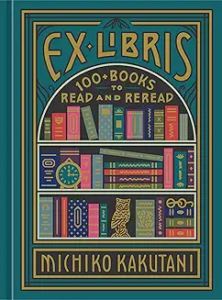Ex Libris: 100 Books to Read and Reread by Michiko Kakutani 2020
Kakutani, is a Pulitzer Prize winning literary critic who wrote book reviews for the New York Times from 1983 to 2017, a remarkable span of reading and writing. Known for her fearless, occasionally negative reviews, a Vanity Fair writer called her “the most powerful book critic in the English-speaking world” and credited her with boosting the careers of George Saunders, Mary Karr, David Foster Wallace, Jonathan Franzen, Ian McEwan, Martin Amis, and Zadie Smith.
This book provides a potential answer to the existential question that I and so many others have wrestled with and attempted to answer, the challenge of “What should I read next.” She does this with a rather remarkable list of books which total more than 150 rather than the eponymous 100 since she lists several choices under some authors’ names. In an informative and readable introduction, Kakutani argues for the central, critical role of reading. At one point, she quotes Virginia Woolf who wrote “The pleasure of reading is so great that one cannot doubt that without it, the world would be a far different and a far inferior place for what it is”. Hurrah! Kakutani goes on to write that “These magical brick-sized objects—made of paper, ink, glue, thread, cardboad, fabric, or leather—are actually tiny time machines that can transport us back to the past to learn the lessons of history, and forward to idealized or dystopian futures. Books can transport us to distant parts of the globe and even more distant planets and universes. They can give us the stories of men and women we will never meet in person, illuminate the discoveries made by great minds, and allow us access to the wisdom of earlier generations. They can teach us about astronomy, physics, botany and chemistry; explicate the dynamics of space flight and climate change; introduce us to beliefs, ideas, and literatures different from our own. And they can whisk us off to fictional realms like Oz and Middle-earth, Narnia, and Wonderfland, and the place where Max becomes king of the wild things.”
She goes on to write that “like all lists and anthologies, the selections here are subjective and decidedly arbitrary….and I could easily have added another hundred books that are equally powerful, moving, or timely…I’m writing less as a critic than as an enthusiast….I’m trying to encourage you to read or reread these books, because they deserve as wide an audience as possible. Because they are affecting or timely or beautifully written. Because they teach us something about the world or other people or our own emotional lives. Or simply because they remind us why we fell in love with reading in the first place.”
With that wonderful introduction, Kakutani launches 300 pages of enthusiastic prose about her selected books. I’d read 49 or so (It’s hard to be exact because she includes selections “like The Works of William Shakespeare”), and marveled at the span of her choices. From poetry (Eliot, Auden) to Dr. Seuss (six titles), from books about the authoritarian challenge to American democracy (and she was writing before trump’s second term!!!) to classic novels like “Moby Dick”, from collections of letters (Flaubert and Van Gogh) to my favorite Vladimir Nabokov memoir “Speak, Memory”, and on and on as the erudite commentary rolled on.
There are literally dozens of ‘read this next’ books, lists, collections, etc. that are already out there. Just to my right in my library in Vermont I can reach out and pull from the shelf the following: “The Top Ten: Writers Pick Their Favorite Books”, “1001 Books You Must Read Before you Die”, “The New York Public Library’s Books of the Century”, Jane Smiley’s list of 100 novels in her “13 Ways of Looking at a Novel”, Nick Hornby’s “Ten Years in the Tub”, Harold Bloom’s “How to Read and Why”, two volumes in which artists and writers select their ten favorite books in the series “Unpacking my Library”, and my personal favorite, Susan Hill’s The Final Forty which are books she would take should she be stranded on a desert island in her book “Howards End is on the Landing.” So does Kakutani make a new and important contribution to this albeit incomplete list of ‘read this now’ books? I believe so. Her breadth and depth of reading, her 34 years of writing critical reviews of literally hundreds of books, and her love of literature make her more than qualified.
The book is not perfect. The Table of Contents is almost unreadable, and the choice to present the books alphabetically by the author’s last name leads to unwieldy leaps from novels to poetry to history and civics. I found the occasional presentation of a books’ cover in a faux art deco mode to be unnecessary and distracting. Why not use the real cover?
Despite these flaws in style, I throughly enjoyed the book and upon finishing it I promptly entered the following into my “To Be Read” notebook: Robert Caro’s “The Passage of Power”, Don DeLillo’s “Underworld”, “The Letters of Gustave Flaubert, 1830-1857”, Gabriel Garcia Marquez’s “One Hundred Years of Solitude”, Stephen Grosz’s “The Examined Life”, Thomas Pynchon’s “Mason and Dixon”, Gary Shteyngart’s “Little Failure”, Zadie Smith’s “White Teeth”……well, you see the problem. So many books, so little time. Nonethelss, I plan to keep her book nearby to occasionally add a new book to BookMarks.
If you enjoy reading books about books, put this one high on your list.



